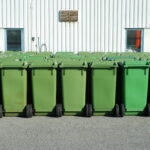WickedLocal.com highlights Massachusetts grocery stores’ diversion programs for wasted food. These programs help grocery stores comply with the Commercial Organics Waste Ban which bans businesses and institutions from disposing of one ton or more of food waste per week.
Big Y sends 2,500 tons of wasted food annually from all Massachusetts and nine Connecticut stores for composting. RecyclingWorks has worked with the Big Y stores to implement these recycling and donation programs, and produced a Supermarket Case Study. Big Y is also a member of the EPA WasteWise program.
Stop & Shop’s Green Energy Facility in Freetown, Massachusetts is an anaerobic digester that receives wasted food from 208 out of 212 New England Stop and Shop stores. The anaerobic digester turns the waste into a biogas that powers 40 percent of the Freetown distribution center’s needs.
Wegmans is also dedicated to leading industry changes, and is as member of the Food Waste Reduction Alliance. Wegmans donated about 14.5 million pounds of food in 2015, and is currently partnering with farms to send the wasted food for anaerobic digestion.
Many more Massachusetts grocery stores are participating is waste reduction initiatives, and in addition to sending surplus and wasted food donation, anaerobic digestion or composting, stores have cardboard and plastic bag recycling programs.
RecyclingWorks in Massachusetts assists businesses and institutions with reducing wasted through food donation and recycling food scraps. The RecyclingWorks website includes Food Donation Guidance for businesses and institutions in Massachusetts interested in establishing a food donation program. To speak to a recycling expert, call our hotline: (888) 254-5525 or email us at info@recyclingworksma.com.

